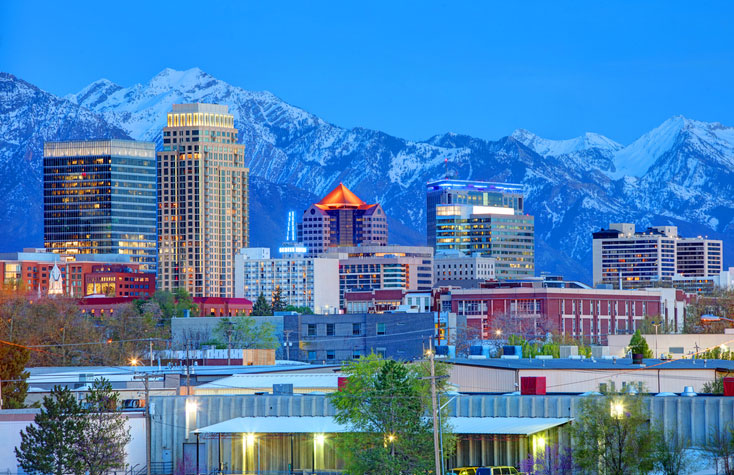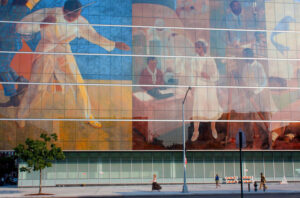Written by Jennifer Williams

Utah’s formal American literary culture is young, first introduced with the arrival of the Mormons in 1847. The influence of Mormon culture was strong and became instrumental in the development of Utah’s early social structure, giving many the solace of an insular society, and perhaps just as many others something worth pushing back against.
From then on, at least until the onset of modern literature, writings here were described as either “insider” (intended for a Mormon audience) or “observer” (intended for Utah’s larger society). Popular writings by non-Mormon authors were generally nothing complex, primarily letters and political speeches, but continued to evolve into the modern era. In fact, the first novel by a Utah author didn’t appear until 1909.
Utah’s literary history may be tinged with religious influence, but as its literary culture has evolved, from it, some of America’s most talented literary icons have been borne.
Utah’s Literary Roots Run in Wildly Different Direction
 Virginia Sorenson was the state’s first Newbery Medal winner. She was born and raised in Utah, had a Mormon upbringing, and was intrigued by Mormon history. In fact, her very first novel, A Little Lower Than the Angels, which debuted in 1942, examined the origins of the polygamist culture. The book pushed the boundaries of tradition for the time but was critically very well received and put her on the map as a major American writer. She continued to write novels that focused on Mormon culture within the context of a traditionalist society. In all, she wrote nine adult novels and seven children’s books with her 1957 children’s novel, Miracles on Maple Hill, winning her the American Library Association’s John Newbery Medal.
Virginia Sorenson was the state’s first Newbery Medal winner. She was born and raised in Utah, had a Mormon upbringing, and was intrigued by Mormon history. In fact, her very first novel, A Little Lower Than the Angels, which debuted in 1942, examined the origins of the polygamist culture. The book pushed the boundaries of tradition for the time but was critically very well received and put her on the map as a major American writer. She continued to write novels that focused on Mormon culture within the context of a traditionalist society. In all, she wrote nine adult novels and seven children’s books with her 1957 children’s novel, Miracles on Maple Hill, winning her the American Library Association’s John Newbery Medal.
Susa Young Gates was an incredibly influential writer and activist in her time. Born in Salt Lake City, her mother was the 22nd wife of Latter-Day Saints (LDS) Church president, Brigham Young, whom she would later go on to biograph and defend. She started her writing career penning short stories and nonfiction pieces under the pen name “Homespun”. Gates believed deeply in causes like women’s rights and education and felt that writing was the best way for her to contribute. As her writing gained notice and her reach became more widespread, she had the incredible opportunity to converse with literary greats like Leo Tolstoy as well as to collaborate with women’s activists like Susan B. Anthony. All in all, these influences led her to accomplish a series of firsts – the first Utah author to publish a novel, John Stevens’ Courtship: A Story of the Echo Canyon War; and founding the American West’s first college paper, College Lantern. Today, she’s remembered as one of Utah’s most influential women.
Wallace Thurman was born in Salt Lake City and grew up in a single-parent home. Thurman and his mother moved around a lot but always ended up back in Salt Lake City living with his grandmother, who ran a saloon and sold liquor without a license. His childhood was tumultuous and plagued by illness. As a teenager, he suffered several heart attacks and even fell ill during the 1918 influenza epidemic. Despite all of this, he finished school and went on to attend college in California, where he started working as a reporter and made a name for himself as a writer. Shortly thereafter, he moved to New York, where he worked as an editor for Messenger and published famous names like Langston Hughes. Thurman came to be a prominent literary figure in black artistic circles for ideas that often ran counter to well-known racial-equality writers like W.E.B DuBois. His ideas were loudly presented in his most famous work, The Blacker the Berry – a book about the realities of racial prejudice within the African American community. Nearly a century later, it remains one of the most controversial and widely read works of the Harlem Renaissance.
Today, large cities like Ogden and Salt Lake City are hubs of literary activity and booming with opportunity for fresh talent. If you’re interested in becoming a writer in Utah, getting involved with your local writing community is a good place to start. In the end, though, a successful writing career will most likely follow a formal education. Whether it’s a bachelor’s degree for up-and-coming undergrads or an MA or Master of Fine Arts (MFA) for those looking to take their writing careers to new levels, Utah offers something for all aspiring authors.
“Every time you try to encourage someone else, your own soul will be flooded with a light and glow of peace and good cheer.”
~ Susa Young Gates
Utah’s Creative Writing Classes, Courses, and Workshops Can Prepare You for a Creative Writing Degree
At this point, you’ve probably realized that there’s no specific outline to follow if you want to become a writer. There’s no neatly penciled blueprint or step-by-step guide that’s going to assure your success. Career writing is simply not that prescriptive. Writing is, by its nature, unique to the author. No two writers produce the same story, nor share the same goals, visions, passion, or style. The finished piece is so exclusive and individualistic because the author’s template – the mind – is of, course, one-of-a-kind.
Your journey as a writer starts with exploring your own mind, reflecting on your ideas, discovering your passion, and finding your vision. The first thing you’ll want to do is connect with your local writing community. Getting involved locally is the best way to network, establish relationships, and find opportunities.
The League of Utah Writers is a state-wide writing organization which aims to help writers develop skill through peer critique workshops and skill-building seminars. It has chapters throughout the state, including areas like Ogden, Salt Lake City, and Provo, so no matter where you are, you’re sure to be able to connect. The League also hosts its annual Pre-Quill Conference in Salt Lake City, which puts on writing workshops, hosts a keynote speaker, and concludes with a book signing event. And, if you want to get your name out there, you can participate in any of the group’s three annual contests – the Quills Awards, the Woolley Awards, and Typewriter Awards – or submit a piece of fiction, non-fiction, or poetry to the League’s 2023 Anthology.
If you like writing poetry, you’ll want to check out the Utah State Poetry Society (UTSPS). This group is a great connection point if you’re looking to improve your poetic skill and connect with fellow poets. The UTSPS has so much for you to get involved in – the annual poetry festival, annual writing contest, and poetry and creative writing seminars. And, with chapters in Ogden, Salt Lake City, and St. George, and even online, you’re sure to find a way to connect!
Don’t forget to check out your local literary circulars, too. This is the best way to stay up to date about events and opportunities in your local area. The Quarterly West is an online literary journal sponsored by the University of Utah. Through its partnership with the Academy of American Poets, all poems published in the Quarterly West are shared with the Academy, giving writers access to a larger audience. The journal also pays generously to winners of its poetry and prose contests, with top prize of $500 plus publication to the winner and $200 to the runner-up.
Writing Colleges in Utah Offering Bachelor’s and Master’s Degrees in Creative Writing Provide a Path to Becoming a Writer
Bringing together your experience, carefully honed talent, and your willingness to incorporate all that feedback from hundreds of hours of workshopping, a degree in creative writing provides your last best hope for success as a professional writer.
Bachelor of Fine Arts (BFA) and Other Bachelor’s Degrees in Creative Writing in Utah
Brigham Young University
COLLEGE OF HUMANITIES
Accreditation: NWCCU
Degree: Bachelor – BA
Private School

- English-Creative Writing track
Weber State University
TELITHA E. LINDQUIST COLLEGE OF ARTS AND HUMANITIES
Accreditation: NWCCU
Degree: Bachelor – BA
Public School

- English-Creative Writing emphasis
Master of Fine Arts (MFA) and Other Master’s Degrees in Creative Writing in Utah
Brigham Young University
COLLEGE OF HUMANITIES
Accreditation: NWCCU
Degree: Master – MFA
Private School

- Creative Writing
University of Utah
COLLEGE OF HUMANITIES
Accreditation: NWCCU
Degree: Master – MFA
Public School

- Creative Writing
Weber State University
TELITHA E. LINDQUIST COLLEGE OF ARTS AND HUMANITIES
Accreditation: NWCCU
Degree: Master – MA
Public School

- English-Creative Writing emphasis




